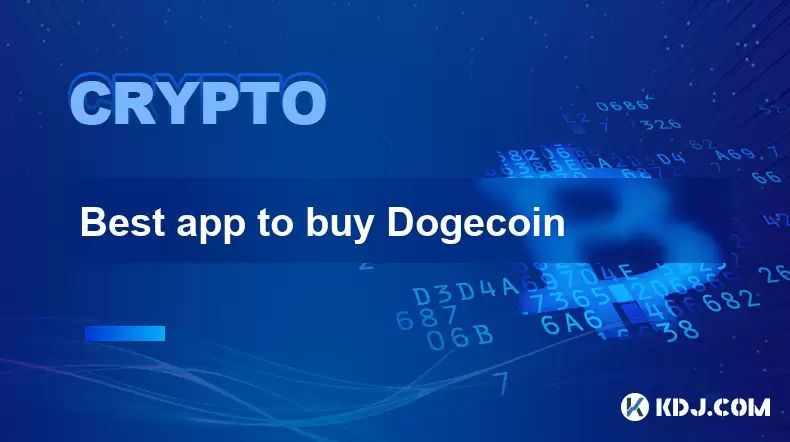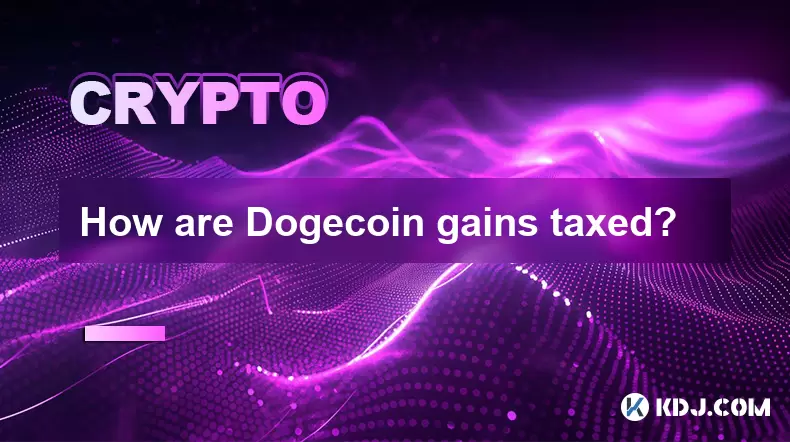-
 bitcoin
bitcoin $87959.907984 USD
1.34% -
 ethereum
ethereum $2920.497338 USD
3.04% -
 tether
tether $0.999775 USD
0.00% -
 xrp
xrp $2.237324 USD
8.12% -
 bnb
bnb $860.243768 USD
0.90% -
 solana
solana $138.089498 USD
5.43% -
 usd-coin
usd-coin $0.999807 USD
0.01% -
 tron
tron $0.272801 USD
-1.53% -
 dogecoin
dogecoin $0.150904 USD
2.96% -
 cardano
cardano $0.421635 USD
1.97% -
 hyperliquid
hyperliquid $32.152445 USD
2.23% -
 bitcoin-cash
bitcoin-cash $533.301069 USD
-1.94% -
 chainlink
chainlink $12.953417 USD
2.68% -
 unus-sed-leo
unus-sed-leo $9.535951 USD
0.73% -
 zcash
zcash $521.483386 USD
-2.87%
What is the difference between a Bitcoincoin wallet address and a Bitcoin address?
Dogecoin and Bitcoin addresses differ due to unique version bytes and encoding, preventing cross-chain transactions and ensuring funds go to the correct blockchain.
Jun 22, 2025 at 10:28 pm

Understanding the Fundamentals of Cryptocurrency Addresses
In the world of cryptocurrencies, wallet addresses serve as unique identifiers for users to send and receive digital assets. Each cryptocurrency typically has its own address format, which is derived from cryptographic algorithms and encoding methods. Both Dogecoin and Bitcoin utilize public-key cryptography, but they differ in their implementation details. Understanding these distinctions is essential for anyone handling multiple cryptocurrencies.
A wallet address is a string of alphanumeric characters that represents a destination on the blockchain. These addresses are generated from a user's public key through hashing functions. Despite their similarities, Dogecoin and Bitcoin addresses are not interchangeable due to differences in network protocols and encoding standards.
Technical Differences in Address Generation
While both Dogecoin and Bitcoin use similar cryptographic principles, the way their addresses are generated differs significantly:
- Bitcoin addresses typically start with a '1', '3', or 'bc1' prefix and use the SHA-256 hashing algorithm during generation. They are usually encoded using Base58Check, which excludes certain characters to reduce ambiguity.
- Dogecoin addresses, on the other hand, often begin with a 'D' and employ the Scrypt hashing algorithm for mining purposes. The address generation process also uses Base58Check encoding, but the version byte used in the encoding differs from Bitcoin's, resulting in different prefixes and checksums.
These variations ensure that transactions are directed to the correct blockchain and prevent cross-chain transfers.
Address Encoding and Version Bytes
One of the core technical reasons Dogecoin and Bitcoin addresses are distinct lies in their version bytes — a small piece of data embedded in the address that tells the network what type of address it is:
- For Bitcoin, the version byte for a standard Pay-to-PubKey-Hash (P2PKH) address is 0x00, which results in addresses starting with '1'. For SegWit (Bech32) addresses, the prefix becomes 'bc1'.
- In the case of Dogecoin, the version byte for P2PKH addresses is 0x1E, leading to addresses beginning with 'D'. This difference ensures Dogecoin transactions are processed only on the Dogecoin network.
Because each blockchain interprets version bytes differently, sending funds to an address meant for another network can result in permanent loss of coins.
Compatibility Issues Between Wallets
Although many wallets support both Dogecoin and Bitcoin, users must be cautious about selecting the correct asset when generating or importing addresses:
- Multi-currency wallets like Trust Wallet or Electrum-Dogecoin handle separate derivation paths and address formats for each coin. They ensure that the correct version byte and hashing method are used per cryptocurrency.
- Single-coin wallets may not recognize addresses from other blockchains at all. Attempting to import a Bitcoin address into a Dogecoin-only wallet will either fail or produce an invalid address.
This distinction emphasizes the importance of verifying the correct cryptocurrency before initiating any transaction.
Practical Implications for Users
Users must always verify that they are using the correct wallet address for the intended blockchain. Sending Bitcoin to a Dogecoin address or vice versa will likely result in lost funds because:
- The receiving network does not recognize the incoming transaction as valid.
- There is no automatic recovery mechanism for such errors in most cases.
- Recovery would require manual intervention from the wallet provider or blockchain explorer, which is rarely possible.
To avoid such mishaps, users should double-check addresses, especially when dealing with multiple cryptocurrencies across different platforms.
Security Considerations When Managing Multiple Coins
Handling both Dogecoin and Bitcoin introduces additional security concerns:
- Private keys should never be reused across different blockchains. Although private keys are mathematically independent, reusing them increases exposure if one network is compromised.
- Always use trusted wallets that clearly differentiate between Dogecoin and Bitcoin addresses.
- Hardware wallets provide an added layer of protection by isolating private keys from online threats while supporting multiple cryptocurrencies securely.
Adhering to best practices helps mitigate risks associated with managing multiple crypto assets.
Frequently Asked Questions
Can I use the same private key for both Dogecoin and Bitcoin?Technically, you can derive different addresses from the same private key for Dogecoin and Bitcoin due to different derivation paths and hashing methods. However, this practice is discouraged due to increased risk of exposure and potential confusion.
Are Dogecoin and Bitcoin addresses visually distinguishable?Yes, Dogecoin addresses typically start with 'D', whereas Bitcoin addresses usually begin with '1', '3', or 'bc1'. These prefixes help users quickly identify which network the address belongs to.
What happens if I send Bitcoin to a Dogecoin address?The transaction will not be recognized by the Dogecoin network, and your Bitcoin may become irretrievable unless the wallet service supports cross-chain recovery — a feature that is extremely rare and not guaranteed.
How can I check if an address belongs to Dogecoin or Bitcoin?You can use a blockchain explorer specific to each network. Entering the address into the corresponding explorer (e.g., blockchair.com for Dogecoin or blockstream.info for Bitcoin) will confirm whether it exists on that chain.
Disclaimer:info@kdj.com
The information provided is not trading advice. kdj.com does not assume any responsibility for any investments made based on the information provided in this article. Cryptocurrencies are highly volatile and it is highly recommended that you invest with caution after thorough research!
If you believe that the content used on this website infringes your copyright, please contact us immediately (info@kdj.com) and we will delete it promptly.
- Blockchains, Crypto Tokens, Launching: Enterprise Solutions & Real Utility Steal the Spotlight
- 2026-01-31 12:30:02
- Crypto Market Rollercoaster: Bitcoin Crash Recovers Slightly Amidst Altcoin Slump and Lingering Fear
- 2026-01-31 13:10:01
- Solana's Stumble and APEMARS' Rise: Crypto Investors Navigate Volatile Markets
- 2026-01-31 13:05:01
- Bitcoin Options Delta Skew Skyrockets, Signaling Intense Market Fear Amidst Volatility
- 2026-01-31 13:00:02
- Cardano Secures Tier-One Stablecoin: USDCX Arrives Amidst Global Regulatory Push
- 2026-01-31 13:00:02
- A Shining Tribute: Oneida Woman, Washington's Army, and the New $1 Coin
- 2026-01-31 12:55:01
Related knowledge

Bitcoincoin burning mechanism
Jul 20,2025 at 09:21pm
What is the Dogecoin burning mechanism?The Dogecoin burning mechanism refers to the process of permanently removing DOGE tokens from circulation by se...

How to earn free Bitcoincoin?
Jul 19,2025 at 10:08pm
What is Dogecoin and Why Earn It?Dogecoin (DOGE) started as a meme-based cryptocurrency in 2013 but has grown into a widely recognized digital asset. ...

Is Coinbase a good wallet for Bitcoincoin?
Jul 19,2025 at 04:42pm
Understanding Coinbase as a Wallet Option for DogecoinWhen considering where to store Dogecoin, Coinbase is often mentioned as a potential option due ...

How to buy Bitcoincoin with PayPal?
Jul 23,2025 at 06:57am
Understanding the Basics of Buying DogecoinBefore diving into the process of buying Dogecoin with PayPal, it’s essential to understand what Dogecoin i...

Best app to buy Dogecoin
Jul 23,2025 at 03:08pm
What Is a Cryptocurrency Exchange and How Does It Work?A cryptocurrency exchange is a digital marketplace where users can buy, sell, or trade cryptocu...

How are Dogecoin gains taxed?
Jul 25,2025 at 07:01am
Understanding the Taxation of Dogecoin GainsWhen it comes to Dogecoin (DOGE), many investors are drawn to its meme-inspired branding and volatile pric...

Bitcoincoin burning mechanism
Jul 20,2025 at 09:21pm
What is the Dogecoin burning mechanism?The Dogecoin burning mechanism refers to the process of permanently removing DOGE tokens from circulation by se...

How to earn free Bitcoincoin?
Jul 19,2025 at 10:08pm
What is Dogecoin and Why Earn It?Dogecoin (DOGE) started as a meme-based cryptocurrency in 2013 but has grown into a widely recognized digital asset. ...

Is Coinbase a good wallet for Bitcoincoin?
Jul 19,2025 at 04:42pm
Understanding Coinbase as a Wallet Option for DogecoinWhen considering where to store Dogecoin, Coinbase is often mentioned as a potential option due ...

How to buy Bitcoincoin with PayPal?
Jul 23,2025 at 06:57am
Understanding the Basics of Buying DogecoinBefore diving into the process of buying Dogecoin with PayPal, it’s essential to understand what Dogecoin i...

Best app to buy Dogecoin
Jul 23,2025 at 03:08pm
What Is a Cryptocurrency Exchange and How Does It Work?A cryptocurrency exchange is a digital marketplace where users can buy, sell, or trade cryptocu...

How are Dogecoin gains taxed?
Jul 25,2025 at 07:01am
Understanding the Taxation of Dogecoin GainsWhen it comes to Dogecoin (DOGE), many investors are drawn to its meme-inspired branding and volatile pric...
See all articles





















![Ultra Paracosm by IlIRuLaSIlI [3 coin] | Easy demon | Geometry dash Ultra Paracosm by IlIRuLaSIlI [3 coin] | Easy demon | Geometry dash](/uploads/2026/01/31/cryptocurrencies-news/videos/origin_697d592372464_image_500_375.webp)




















































